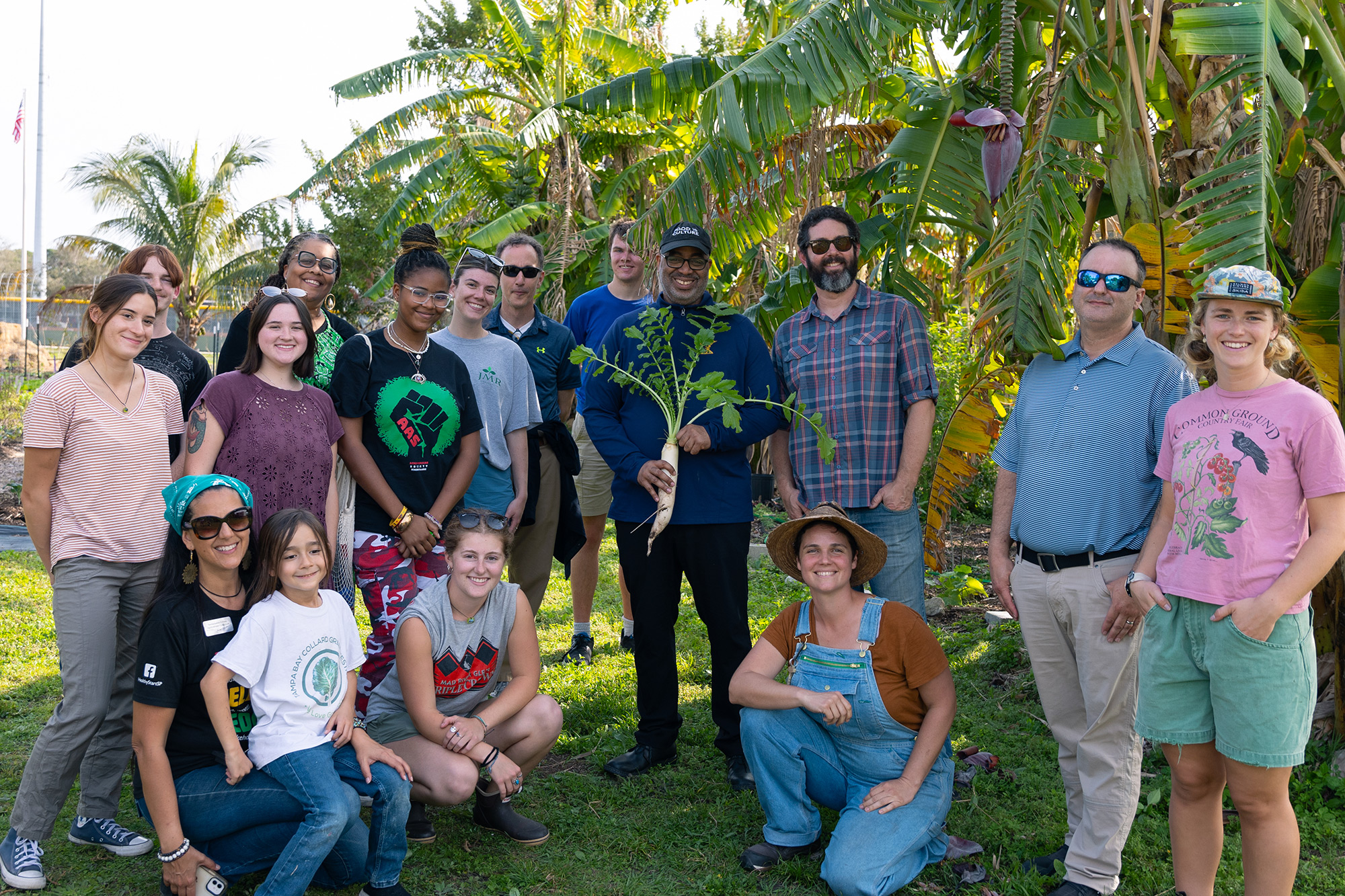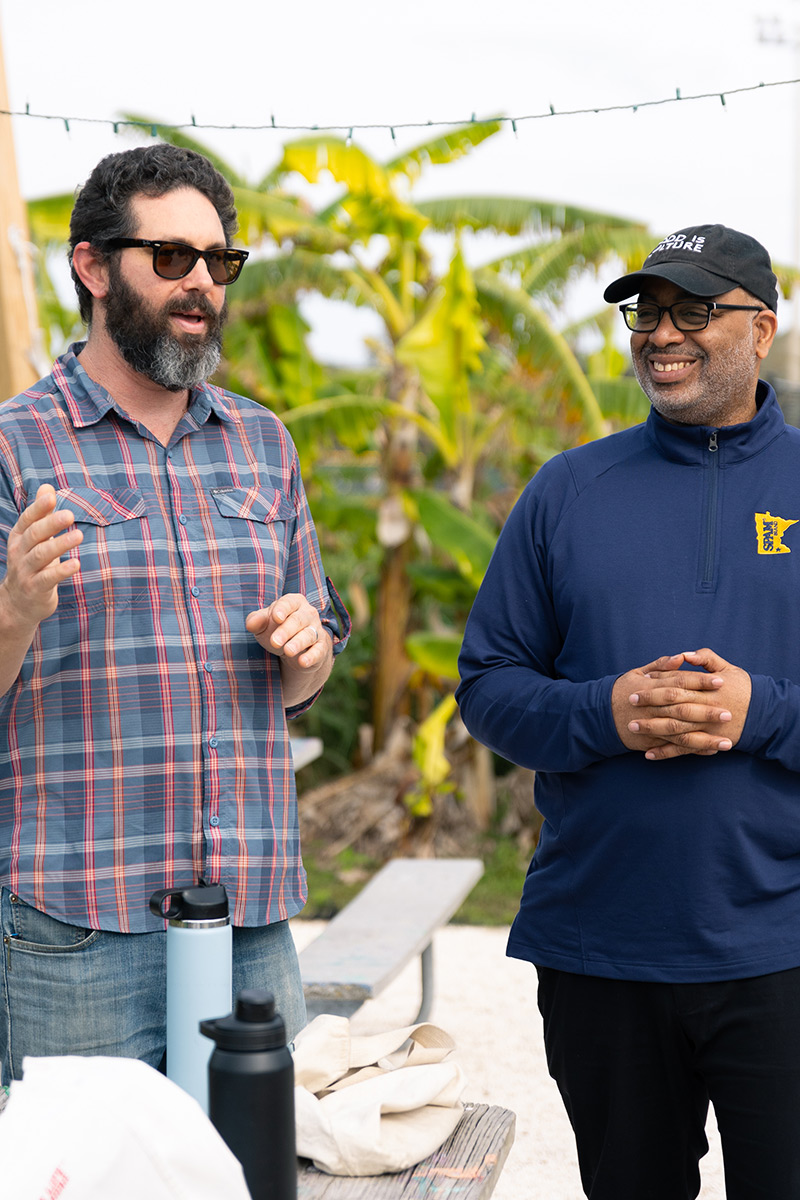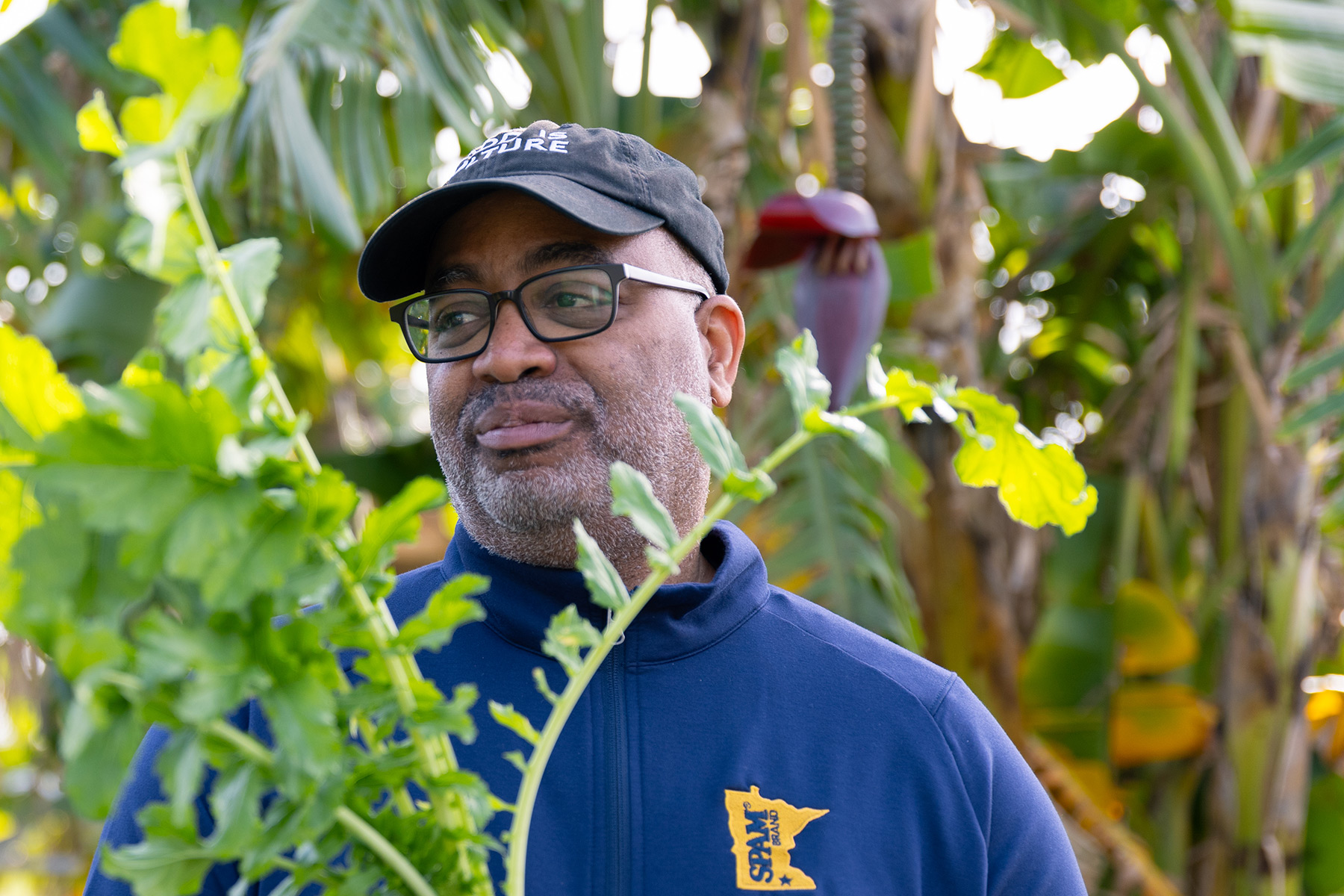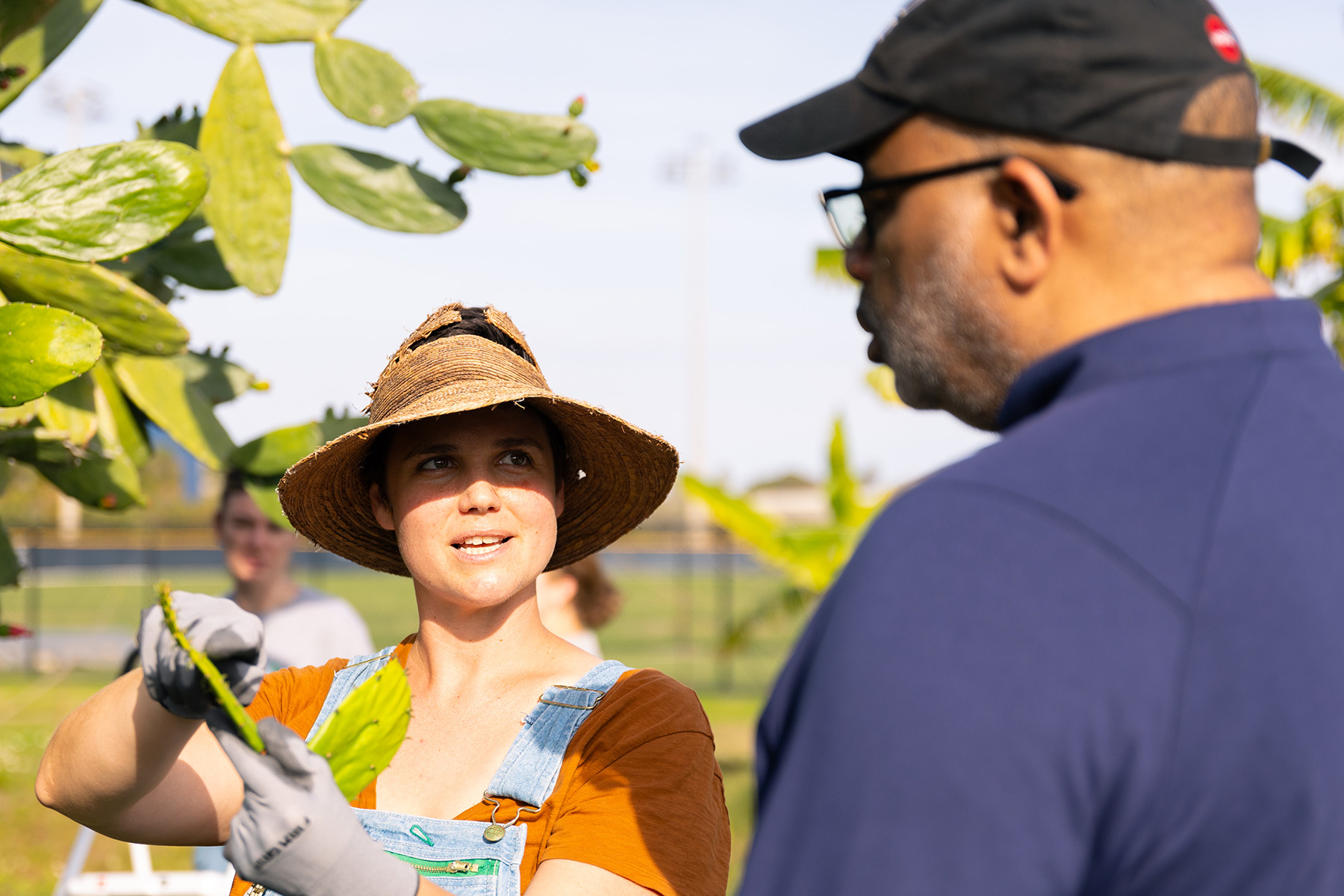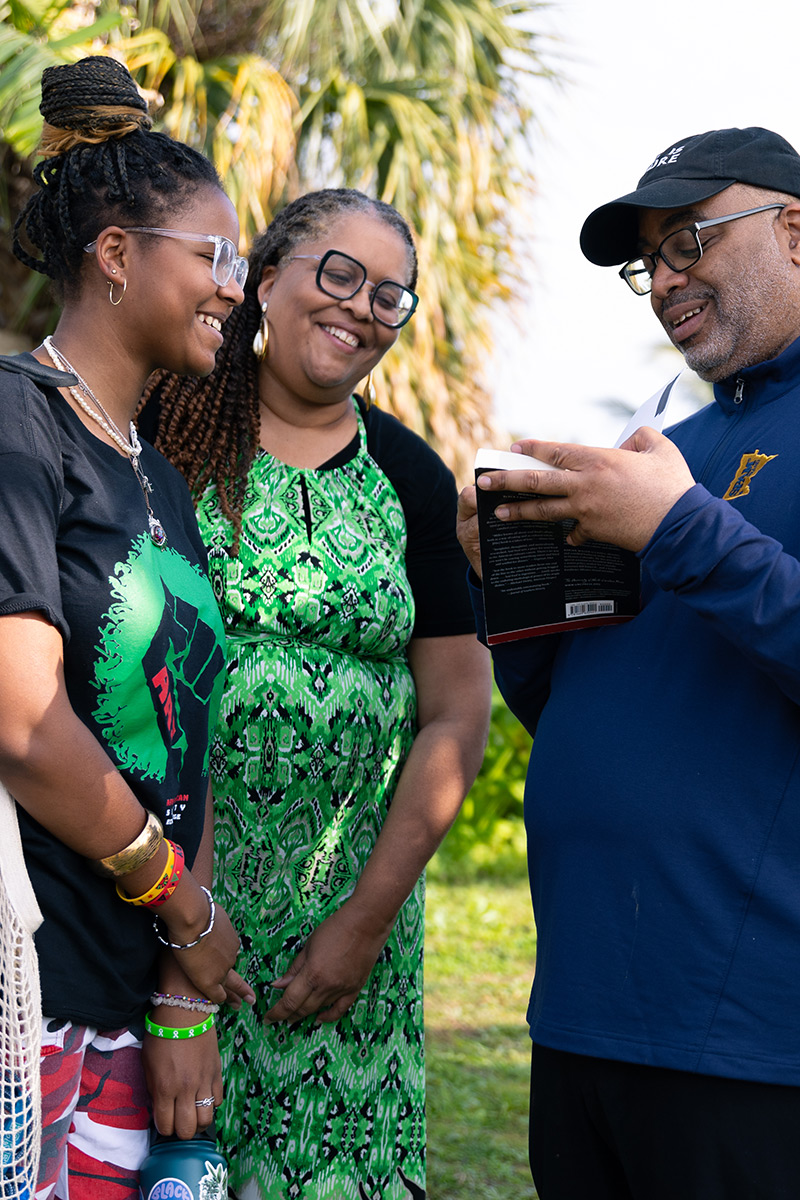The day before the Tampa Bay Collard Green Festival last February, acclaimed author and soul food historian Adrian Miller, the featured speaker at the event, paid a visit to the Eckerd College Community Farm to meet with students and faculty, tour the farm, and add some seasoning to the story of a food enjoyed for centuries by millions of people around the world—barbecue.
Miller is a perfect example of someone who refused to accept the status quo. After he graduated from Stanford University in 1991 with a degree in international relations, he earned a law degree from Georgetown University. From 1999 to 2001, he served as a special assistant to then-President Bill Clinton, helping to address issues of racial, religious and ethnic reconciliation. Miller went on to serve as a senior policy analyst for Colorado’s then-Governor Bill Ritter Jr.
Now Miller lives in Denver and is the first African American and first layperson to hold the position of executive director of the Colorado Council of Churches. He also has been featured in the Netflix series High on the Hog: How African American Cuisine Transformed America.
But Miller is best known for his writing. His first book, Soul Food: The Surprising Story of an American Cuisine, One Plate at a Time, won the James Beard Foundation Award for Scholarship and Reference in 2014. His second book, The President’s Kitchen Cabinet: The Story of the African Americans Who Have Fed Our First Families, from the Washingtons to the Obamas, was a finalist for a 2018 NAACP Image Award. And his third and most recent book, Black Smoke: African Americans and the United States of Barbecue, earned him a second Beard Award in 2022. This is an excerpt from Black Smoke (The University of North Carolina Press, 2021):
In May 2004, I was intrigued by a Food Network promotional commercial for a one-hour special titled Paula’s Southern BBQ. At the time, I knew much more about barbecue than I did about the host, Paula Deen, and I hoped that Deen would be presenting more of an overview of Southern barbecue culture rather than simply a cooking lesson or a cooking competition.
I tuned in for the show. By the time the credits rolled, though, my mouth was hanging open—not from an appetite for barbecue but because I was stunned that not one single African American had been interviewed on camera. I saw shots of Black people in the background doing the actual work, but they were anonymous and voiceless.
Today it may seem naive, but I recall thinking, as I turned off the television, Is this what Black barbecuers have become? They’re just B-roll footage now?
Miller told the group of two dozen people at the farm in February that he hated being a lawyer. “I would sing spirituals in my office,” he said with a grin. “Even my white friends would join in. No, becoming a food writer and historian was an accidental journey. And a happy one.”
In the late 1980s, Miller learned that profiles of Black chefs and a history of Black culinary traditions in America had yet to be written. “So I accepted the challenge,” he said.
He read 3,500 oral histories of Black enslaved people and visited 150 soul food restaurants across the country. What he learned about barbecue surprised him.
“I started out believing that I was going to definitively prove that Southern barbecue is rooted in West Africa,” he said, “but the historical evidence points to culinary practices in the Americas. Indigenous meat-smoking traditions formed the foundation for Southern barbecue.”
Miller said some people argue that there’s nothing exceptional about barbecue, that people around the world cook meat over a fire, a practice done in Europe for thousands of years. “And I get negative reactions from Black people for writing that fried chicken and barbecue were not started in West Africa,” he added. “But barbecue is more about place and class than race. That’s the big takeaway. And really, when you come down to it, we’re all just giving our best guesses.”
He said his next book will tell the story of African American street vendors “because they did so much to shape the food scenes of great cities like Charleston, South Carolina; Chicago, Illinois; New Orleans, Louisiana; New York, New York; and Savannah, Georgia. I’ll share the ways these vendors represented West Africa through their dress, their streets and the foods that they introduced.”
And if Miller sat down to dinner, what would be his favorite meal? “Mustard and turnip greens with smoked turkey,” he answered. “With whole, bone-in fried catfish and coleslaw.”
The opportunity to have a two-time James Beard Award winner on campus and to benefit from his knowledge “is an opportunity of a lifetime,” says David Himmelfarb, Ph.D., an environmental studies instructor and internship coordinator at Eckerd who also is the faculty director of the farm. “And it was a real pleasure to share our project with him, and to see his enthusiastic response.
“To be able to have the farm be a place where visiting scholars and community groups can gather is amazing. It’s a reminder that food is not just something you eat; it’s something to think about in so many different ways.”
Adds Mae Peterson, a senior environmental studies student from Bristol, Vermont, who is a farm ambassador and led Miller’s tour, “One of the pillars of the farm is the liberal arts approach. It’s not just the food itself but the stories food has to tell. And to have Adrian Miller share his stories about Black food culture and its history really fits in well with what we do. It benefited all of us to meet him and hear his stories, because he’s really done incredible work.”
Connie Johnson drove nearly two hours from Lakeland to the Eckerd campus to join her daughter, Jenna Siddeeq, a first-year student at the College who also is an intern at the farm. “Once I saw the notice Adrian Miller was coming, I knew it would be a great opportunity to learn more about food,” Johnson says. “He brought everybody in, asked people questions, and I loved his past—especially that it didn’t go in a straight line. He made interesting things you don’t usually think about.
Johnson says she recently bought a 7-acre parcel of land outside of Durham, North Carolina, where she plans to build a family compound. And start a farm. “So I told my daughter to take all the notes she can,” she adds with a chuckle, “because I grew up in Chicago, and I know nothing about farming.”





